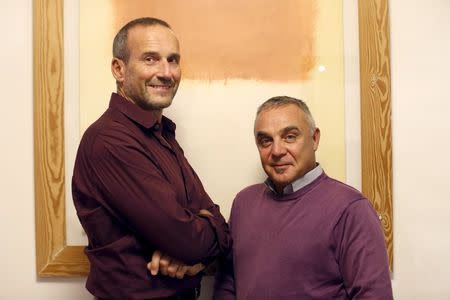Italy leaves gay couples waiting at the altar
By Isla Binnie and Crispian Balmer ROME (Reuters) - Rosario Murdica and Gianni Finocchietti always wanted to get married in Italy, but after 30 years together they lost hope of ever tying the knot in their home country and instead said their vows in Portugal. Italy is the last major country in the West that has not given same-sex couples any legal recognition, and was condemned this year by the European Court of Human Rights for failing to introduce long-delayed legislation. Centre-left Prime Minister Matteo Renzi promised a bill allowing civil unions would be approved by year-end, after more than two decades of failed attempts by various parties. Despite only aiming to legalise civil partnerships with limited rights that fall short of full gay marriage, the bill has been held up, highlighting Italy's struggle to go against Roman Catholic teaching. The delay also reveals frictions within Renzi's disparate coalition and raises questions about his ability to push aside powerful lobbies that have stymied reform in the past. The political shenanigans, which prompted a junior minister to go on hunger strike earlier this year in an effort to speed up the process, have angered homosexual couples. "There is no difference between love. There is no difference between us and heterosexual couples. We are not asking for any special favours," said Murdica, 57, a labour market researcher. "We are tired of being treated like second-class citizens," said his partner, Finocchietti, 61, a university researcher. Finocchietti and Murdica have no legal rights as a couple in Italy, denying them tax breaks, a portion of a deceased partner's pension, automatic inheritance and the right to confidential medical briefings in case of illness. PULPIT POWER Senator Monica Cirinna, author of the government's draft legislation for civil unions, says Italy is still stuck in the "Middle Ages." She argues that the country needs to approve her law to boost its international credibility. "We can hardly think we can go to Europe beating our drum about immigration, (or breaking) the deficit limit, and then be last in the line when it comes to human rights," Cirinna, who is a member of Renzi's Democratic Party (PD), told Reuters. Renzi's 18 month-old coalition has enacted a number of reforms, on everything from labour regulations to banking norms, but is swimming against a conservative tide over gay marriage. Italy's parliament is just a five minute drive from the Vatican, the seat of power for the Roman Catholic Church which exerts considerable sway over domestic politics, even as its power elsewhere appears to recede. Pope Francis on Sunday defended marriage as "an indissoluble bond" between a man and a woman. "This is God's dream for his beloved creation," he said as he opened a three-week gathering of bishops that is set to formulate Catholic policy on family issues for decades to come. Influential Italian Cardinal Camillo Ruini reaffirmed the church's intense opposition to the proposed civil unions legislation, telling Corriere della Sera newspaper on Sunday it would lead inevitably to full marriage rights. "If they follow this path, it will be hard not to have protests," Ruini said. A day earlier, the Vatican fired a senior priest after he publicly announced he was gay and acknowledged having a partner. "We live under the shadow of the Vatican dome," said Cirinna. "Catholicism here is different than in other countries. It is a presence. The pope speaks at his window every Sunday." Staunchly Catholic Ireland voted in a referendum in May to legalise full gay marriage, following in the footsteps of other Catholic countries such as France, Spain and Portugal. The Italian bill offers only very restrictive adoption options and closes the door to assisted reproduction technology but church officials here make no bones about their objections. Paolo Gentili, director of the pastoral office for the family at the Italian Bishops' Conference (CEI) said affection between homosexuals could be strong, but was not a marital affection. "A homosexual who is honest with himself knows that he and his partner will never become parents together," he said. "DRINK, DRUGS AND SEX" The Church has found an ally in the small New Centre-Right (NCD) party that is in Renzi's coalition and is struggling to carve out a clear-cut political identity at a time when parties in Italy come and go with the seasons. Looking to claim the Catholic vote, the NCD has put up a high-profile fight against Cirinna's bill, presenting some 3,000 out of a total 4,320 amendments that were pinned to the legislation, helping to snarl its parliamentary passage. Most were ruled invalid, but a total of 1,693 amendments remain. Because of a technicality, the bill has to pass through the Senate by Oct. 15 to have a chance of full approval by year end. With the upper house locked in debate on constitutional reform it looks unlikely to meet that cut-off date. "They won't do it this year, they won't do it next. To be frank, I don't think they will ever do it," said Massimo Porcelli, 53, an Italian advertising manager who married his partner, TV producer Salvatore Stolfi in New York in 2012. An opinion poll by the Piepoli Institute in May said 67 percent of Italians supported some form of civil unions while 51 percent backed full gay marriage. But Porcelli and Stolfi say Italians are not as open-minded as they might claim to be. "The stereotype of gays is very strong here. People think our life is full of drink, drugs and sex," said Stolfi. "I think there is an undercurrent of fear that giving us marriage rights will somehow promote and spread our imagined lifestyle." (Writing by Crispian Balmer, editing by Gavin Jones and Philippa Fletcher)

 Yahoo News
Yahoo News 

